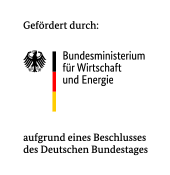Expansion of the limitations of use of the FLOX technology for low and high burner powers (Mikro-FLOX / Mega-FLOX)
The aim of the project is to extend the application limits of the FLOX technology to small burner capacities. The flameless oxidation (FLOX) is established in a power range of 30–300 kW and shall now be tested at power levels < 30 kW. For this purpose, a series of parameter variations for testing flameless oxidation at low outputs will be carried out with a FLOX burner from WS Wärmeprozesstechnik GmbH on a test stand set up for the project at the Institute for Industrial Furnace Construction and Thermal Engineering. The influences of burner capacity, air number, air preheating temperature, fuel gas composition, burner geometry and reactor temperature on the reaction zone of the spatially distributed combustion reaction are investigated. Based on the CO and NOX concentration measured in the exhaust gas, a statement can be made about the stability of the flameless state of the combustion reaction. By visualizing the OH*-chemiluminescence of the reaction, a statement can be made about the influence of the investigated parameters on the position of the reaction zone in the reactor.
The experimental investigations carried out show a stable behaviour in wide ranges of the investigated values for all tested parameters. In all cases, the NOX concentration in the exhaust gas is well below the prescribed limit values of 50–100 ppm for combustion plants with an installed capacity of less than 50 MW. The maximum measured concentration is 55 ppm. A complete burnout of the fuel gases can be achieved. The CO emissions during the measurement series are less than 10 ppm which means a complete conversion of the fuel used within the experimental reactor. The FLOX technology can also be used in a wide variety of applications in the power range below 30 kW.
The final report can be obtained from the Technical Information Library Hanover (TIB) Welfengarten 1B, 30167 Hanover, Germany.

The research project with the funding code 03ET1078B was funded by the Federal Ministry of Economics and Energy on the basis of a resolution of the German Bundestag.
